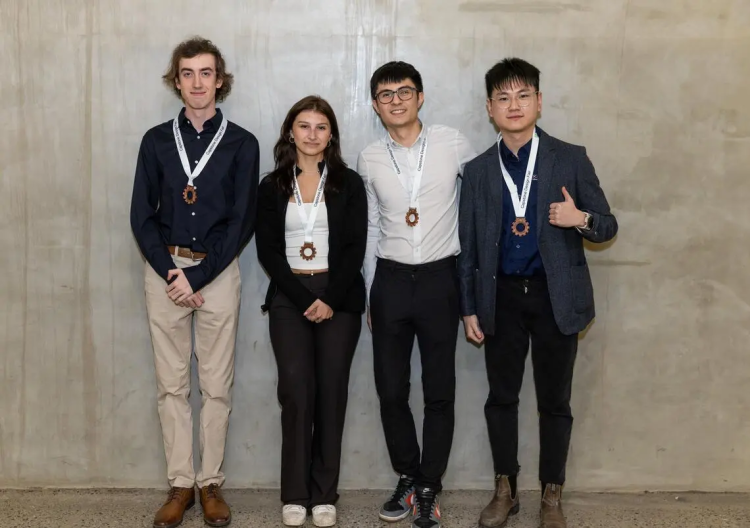If there was any doubt UCalgary was making a mark on artificial intelligence-based research, those doubts were dismissed through a July 9 funding announcement from the Government of Canada.
Of the 11 UCalgary teams that received funding in the New Frontiers in Research Fund (NFRF): Exploration Grants program, four of them are working on projects with an AI focus.
For all the awardees, the number of AI projects funded through the NFRF program is a testament to UCalgary's commitment to advancing AI research across all areas of study.
"AI research is transdisciplinary research," explains Dr. Jessalyn Holodinsky, PhD, a co-principal investigator on a project exploring how to use large language models (LLMs) to optimize emergency departments. "To have that support for transdisciplinary research and the Institutes for Transdisciplinary Scholarship is a huge accelerator for AI work."
We spoke with the principal investigators of these four projects to learn more about how they're using AI and LLMs to advance their research.
Artificial Intelligence for health care: A transdisciplinary approach towards health equity
- Primary Investigator: Dr. Mariana Bento, PhD, assistant professor, Department of Biomedical Engineering and Department of Electrical and Software Engineering, Schulich School of Engineering
Using a transdisciplinary approach, this team is exploring fairness, trustworthiness, and transparency of AI in healthcare systems. The project brings together experts in engineering, philosophy, computer science, and data ethics to tackle three critical areas:
- Ensuring AI is trained on accurate, diverse, and representative datasets.
- Evaluating AI models not just for accuracy, but for fairness, reliability, and trustworthiness.
- Creating an open-access tool to help Canadians understand AI in healthcare and their rights.
By bridging technical innovation with ethical safeguards, the project aims to improve patient trust, reduce bias, and train a new generation of AI practitioners who value both performance and responsibility.
For Bento, receiving this type of funding is an exciting recognition of her work.
"It's positive feedback that we are going in the right direction and provides the encouragement to continue to push forward."
- Co-applicants: Dr. Sarah Eaton, PhD, Werklund School of Education; Dr. Marina Gavrilova, PhD, Faculty of Science; Dr. Ali Karimi, PhD, Faculty of Arts
- Collaborators: Ana Arantes, Cumming School of Medicine; Salome Bosshart; Dr. Gideon Christian, PhD Faculty of Law; Dr. Ronnie de Souza Santos, PhD, Schulich School of Engineering; Dr. Megan Delehanty, PhD, Faculty of Arts; Leticia Rittner (University of Campinas), Alexander Stebner (Münsterlingen, Swizerland/University of Calgary), Tarra Drevet (Canadian Agri-Food Policy Institute)
Leading AI-driven advances in brain tumor glymphatics
- Primary Investigator: Dr. Candice Poon, MD, PhD, FRCSC, assistant professor, departments of Clinical Neurosciences and Oncology, Cumming School of Medicine
Dr. Candice Poon agrees with Bento that funding such as this is validation of her research.
"As an early career researcher, it's really important to get that initial sort of encouragement from granting agencies that what you're studying is important and has relevance."
Poon's research focuses on understanding the role of the glymphatic system a network of fluid-filled spaces around blood vessels that supports nutrient delivery, waste clearance, and immune cell movement in the development and progression of brain tumours, particularly gliomas and brain metastases. The study combines AI techniques with clinical imaging, surgical data, and molecular tissue analysis to explore how dysfunction in this system may create conditions that favour tumour growth.
"This is a largely unexplored area of brain tumour biology, potentially identifying new therapies by understanding glymphatic dysfunction," she explains. "Our ultimate goal is to improve survival and quality of life for brain tumour patients."
- Co-Applicant: Dr. Yunyan Zhang, MD, PhD, Cumming School of Medicine
- Collaborators: Dr. Darren Clark, PhD, Cumming School of Medicine; Charlotte D'Mello, Hotchkiss Brain Institute; Dr. Paolo Federico, MD, PhD, Cumming School of Medicine; Dr. Pierre LeVan, PhD, Cumming School of Medicine; Dr. Garnette Sutherland, MD, PhD, Cumming School of Medicine
Enhancing typing skills for nonspeaking autistic people through a co-designed, AI-assisted learning system
- Principal Investigator: Dr. Diwakar Krishnamurthy, PhD, PEng, professor, Department of Electrical and Software Engineering, Schulich School of Engineering
For Dr. Krishnamurthy, finding ways to help nonspeaking autistic people communicate has a personal aspect to it. His son is autistic and partially verbal, but does have struggles communicating. Krishnamurthy was able to teach him how to type, which opened many doors for him.
"My son, like all autistic people, is very smart. If we can adapt the education methods and provide alternative ways to communicate, we can break down these barriers, get past our default assumptions and watch them thrive."
Working alongside autistic team members, Krishnamurthy is looking to develop an innovative, affordable, and automated tablet-based system that will deliver engaging multimedia typing lessons. Drawing on a freely accessible, community-contributed library, the system will adapt to each user's unique sensory and motor needs, making communication training more personalized and inclusive.
"It's thrilling to collaborate directly with people who have overcome systemic barriers and taught themselves to communicate, often in the face of doubt and lack of institutional support, and to see their lived experience shape the technology from the ground up," he says.
- Co-principal investigator: Vikram Jaswal (University of Virginia)
- Collaborators: Madison Imber (Mentoring Minds), Lyndon Parakin (Autism Calgary)
Optimizing operations of emergency departments using multi-agent large language models
- Co-principal investigators: Dr. Steve Drew, PhD, PEng., assistant professor, Department of Electrical and Software Engineering, Schulich School of Engineering; Dr. Jessalyn Holodinsky, PhD, assistant professor, departments of Emergency Medicine, Community Health Sciences, and Clinical Neurosciences, Cumming School of Medicine
Improving patient care and reducing clinician burnout are top of mind for Drs. Drew and Holodinsky, who are using LLMs to find ways to optimize how emergency departments operate.
This project combines two innovations to improve emergency care: an AI tool that rapidly summarizes patient medical history so doctors can focus more on the patient in front of them and less on their computer screens, and a LLM-powered multi-agent simulation that models emergency department workflows to test improvements before they're implemented.
"Almost everyone will visit the emergency department at some point, and this project has the potential to reduce wait times, ease clinician burnout, and improve patient care," says Drew.
Seeing the project receive this level of funding is extra special for Drew and Holodinsky.
A team of four engineering students played a key role in kickstarting this research by developing the first prototype of the emergency department AI tool as part of their Capstone project. Their work was showcased at the Schulich Capstone Fair on April 1, where it earned a bronze medal. Their achievement not only demonstrated the potential of AI in healthcare but also helped lay the foundation for the project's continued success.
- Co-applicants: Dr. Eddy Lang, MD, Cumming School of Medicine; Dr. Zack Marshall, PhD, Cumming School of Medicine; Dr. Tracie Risling, PhD, Faculty of Nursing; Braden Teitge, Cumming School of Medicine; Dr. Tyler Williamson, PhD, Cumming School of Medicine; Jiayu Zhou (University of Michigan, Ann Arbor)
- Collaborators: Dr. Tanvir Turin Chowdhury, PhD, Cumming School of Medicine

Bronze Winners in the April 1, 2025 Schulich Engineering Design Fair: Alexander Burn, Macayla Konig, Owen Guldberg, and Zirui (Samuel) Wang. Photo Credit: Adrian Shellard
Other UCalgary NFRF-funded projects
Humanizing infant formula using precision fermentation
- Primary investigator: Dr. Cameron Semper, PhD, Cumming School of Medicine
- Co-applicants: Josephine Yee (The Pennsylvania State University), Yadira Tejeda Saldana (New Harvest Canada)
Characterization of small intestinal microbiome biomarkers of treatment response in Parkinson's disease
- Primary investigator: Dr. Davide Martino, MD, PhD, Cumming School of Medicine
- Co-primary investigator: Dr. Ian Lewis, PhD, Faculty of Science
- Collaborators: Dr. Laura Sycuro, PhD, Cumming School of Medicine; Joseph Wang
Social innovation in engineering for climate-neutral cities
- Primary investigator: Dr. Lina Kattan, PhD, Schulich School of Engineering
- Co-primary investigator: Dr. Alain Pietronio, PhD, Schulich School of Engineering
- Co-applicants: Dr. Byron Miller, PhD, Faculty of Arts; Dr. Seiran Heshami, PhD, Schulich School of Engineering; Dr. Jason Hawkins, PhD, Schulich School of Engineering; Alberto de Salvatierra, School of Architecture, Planning and Landscape
Regulation of thought content as transdiagnostic process underlying internalizing and externalizing disorders
- Primary investigator: Dr. Julia Kam, PhD, Cumming School of Medicine
- Co-primary investigator: Dr. Kara Murias, MD, Cumming School of Medicine
- Collaborators: Dr. Brandy Callahan, PhD, Faculty of Arts; Dr. Andrea Protzner, PhD, Faculty of Arts; Matthias Wilms, Hotchkiss Brain Institute; Dr. Paul Arnold, MD, Cumming School of Medicine
Rationally designed microbial therapeutics to treat recurrent urinary tract infection
- Primary investigator: Dr. Xiaofan Jin, PhD, Schulich School of Engineering
- Co-primary investigator: Charlène Roussel (University of Ottawa)
- Collaborators: Alexie Savchenki, Duane Hickling (Ottawa Hospital Research Institute), Yuding Wang (Children's Hospital of Eastern Ontario), See-Yeun Ting (Academia Sinica)
Engineered encapsulated encrypted peptides as immune regulator treatment for infectious diarrhea in pigs
- Primary investigator: Dr. Eduardo Cobo, DVM, Faculty of Veterinary Medicine
- Collaborators: Hector Arguello-Rodriguez (University of Leon), Dr. Maria Camila Ceballos, PhD, Faculty of Veterinary Medicine; Dr. Antoine Dufour, PhD, Cumming School of Medicine; Dr. Farhad Maleki, PhD, Faculty of Science; Leluo Guan (UBC)
- Co-applicants: Dr. Amir Sanati Nezhad, PhD, Schulich School of Engineering; Cesar de la Fuente (University of Pennsylvania)
Highly dexterous robotic endoscope for improved access to minimally invasive surgery and diagnostics
- Primary investigator: Dr. Matthias Amrein, PhD, Cumming School of Medicine
- Co-primary investigator: Dr. Salvatore Federico, PhD, Schulich School of Engineering
- Collaborators: Mustafa Al-Saiedy, MD, Cumming School of Medicine; Matthew Topham, Lilian Salm (Inselspital-Universitaetsspital Bern), Moritz Reinders (Eraneos Group)
- Co-applicant: Dr. Kartikeya Murari, PhD, Schulich School of Engineering; Dr. Oluwatomilayo (Tito) Daodu, MD, Cumming School of Medicine
Mariana Bento, PhD is an assistant professor in the Schulich School of Engineering. She is also a member of the Hotchkiss Brain Institute and the Alberta Children's Hospital Research Institute at the Cumming School of Medicine.
Candice Poon, MD, PhD, FRCSC, is an assistant professor in the Cumming School of Medicine (CSM). She is also a member of the Hotchkiss Brain Institute, the Arnie Charbonneau Cancer Institute, and the Alberta Children's Hospital Research Institute at the CSM.
Diwakar Krishnamurthy, PhD, PEng, is a professor and research chair (technologies to foster better inclusion of neurodivergent individuals) in the Schulich School of Engineering. He is also a member of the Hotchkiss Brain Institute, The Mathison Centre for Mental Health Research & Education, and the Alberta Children's Hospital Research Institute, at the Cumming School of Medicine. Krishnamurthy is also a Parex Resources Innovation Fellow Alumnus (2023-25) in the Schulich School of Engineering.
Jessalyn Holodinsky, PhD, is an assistant professor in the Cumming School of Medicine. She is a faculty researcher in the Centre for Health Informatics, and a member of the Hotchkiss Brain Institute, the O'Brien Institute for Public Health, and the Alberta Children's Hospital Research Institute. She is also the director, Artificial Intelligence & Data Education and Ethics for the Office of Faculty Development in the Cumming Schol of Medicine.












